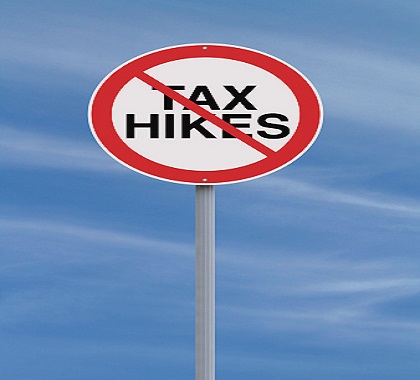Problem
For decades, Illinois lawmakers have misspent state funds like drunken sailors. Even worse, they have increased taxes to the point that the Prairie State is now on the precipice of economic Armageddon.
Altogether, Illinois legislators have created billions in unfunded liabilities while imposing the highest tax burden in the United States. The average Illinois household earning the median U.S. income pays a whopping 14.9 percent in state and local taxes alone.
As a result of Illinois’ decades-long spending and taxing binge, the state is experiencing an exodus that will continue to worsen its shaky economic situation as time marches on.
Under a progressive tax system, tax rates rise as the taxable income amount increases. Progressive taxes are a form of income redistribution, with the taxes paid by higher income earners used to cover government services for lower income earners. While supporters of the progressive tax argue this is both fair and an example of social justice, these taxes violate democratic tax principles by placing an undue burden on certain groups of taxpayers. Even under a flat tax, those who earn higher incomes pay more in taxes, the “social justice” progressive tax proponents claim to seek.
Progressive taxes are problematic for several reasons. First, as a 2008 Organisation for Economic Co-operation and Development working paper explained, progressive income tax systems across the world have negatively impacted economic growth.
Progressive tax systems also make it more difficult to accurately predict tax revenue and prepare state budgets. Progressive tax systems result in tax revenues that are more volatile than flat tax systems. As the economy waxes and wanes, tax revenue received from taxpayers, especially those in the upper brackets, rises and falls. When the economy improves, more individuals and corporations move into higher tax brackets and pay larger percentages of their higher incomes in taxes.
Policy Solution
Unfortunately, Illinois lawmakers are on the verge of making the state’s dire fiscal situation even worse by pushing for a progressive income tax, which would likely increase the rate at which residents are abandoning the state.
At present, the Illinois Constitution requires a flat income tax. Changing the current tax structure to a progressive system would require a state constitutional amendment approved by a voter referendum and three-fifths of the state legislature.
Despite liberals’ talking points to the contrary, the flat tax is beneficial for several reasons. First and foremost, a flat tax does not disproportionately penalize the most productive residents with higher tax rates. Second, a flat tax is fair to all. Third, a flat tax boosts economic performance by eliminating the tax bias against savings and investments.
Although supporters of the progressive “fair tax” claim it will solve the Prairie State’s budget crisis, this could not be further from the truth. Illinois does not have a tax revenue problem. Rather, Illinois has a massive spending problem.
Illinois is already an economic basket case: its population is decreasing at an alarming rate, unemployment remains high, and future unfunded liabilities keep growing. Simply put, increasing taxes on Illinois residents is the wrong path, and will only compound the Prairie State’s economic woes. Illinois legislators should focus on making the state a more attractive place for businesses and residents by decreasing spending, lowering taxes, and reducing unnecessary regulations.
Instead of focusing only on the tax revenue side of the equation, lawmakers should focus on fixing the structural issues on the spending side. This is where the real problem lies and where the long-term fiscal health of the state can be shored up.
Policy Message
Point 1: Currently, the combined state and local tax rate in Illinois ranks as the most severe burden in the country, according to a March report by WalletHub.
Point 2: Every 4.6 minutes, another resident flees the Prairie State for greener pastures.
Point 3: Since the Great Recession in 2008, Illinois’ tax revenues have increased faster than all Midwestern states, except Minnesota, according to a recent study from Pew Charitable Trusts.
Point 4: Imposing a progressive income tax is likely to have long-term negative effects on all Illinois residents by further damaging the state’s business climate and eliminating more jobs.
Point 5: By increasing taxes on higher income earners, progressive tax systems disincentivize certain economic activities like investment, entrepreneurship, and financial risk-taking—activities that are the engines of economic growth and more commonly undertaken by those with higher incomes.
Point 6: According to 2019 report released by the Fraser Institute, Illinois is one of the least free states in the nation, ranking 34th in the country when it comes to economic freedom, recent slides in this ranking came due to recent tax hikes and increased fees.
Point 7: Relying on a small percentage of higher income taxpayers for a larger percentage of revenues often generates larger budget gaps during economic recessions.
Income tax Hike Dropped Illinois’ Economic Freedom Rank, ‘Fair Tax’ would Drop it More
https://www.illinoispolicy.org/income-tax-hike-dropped-illinois-economic-freedom-rank-fair-tax-would-drop-it-more/
In this article, Orphe Divounguy and Bryce Hill of the Illinois Policy Institute examines the potential effects of the “fair tax.”
7 Reasons to Reject a Progressive Income Tax in Illinois
https://www.illinoispolicy.org/7-reasons-to-reject-a-progressive-income-tax-in-illinois/
In this article, Bryce Hill of the Illinois Policy Institute outlines seven reasons Illinois should protect its flat income tax structure.
Ten Principles of State Fiscal Policy
https://heartland.org/publications-resources/publications/ten-principles-of-state-fiscal-policy
The Heartland Institute provides policymakers and civic and business leaders a highly condensed, easy-to-read guide to state fiscal policy principles. The principles range from “Above all else: Keep taxes low” to “Protect state employees from politics.”
Progressive Income Tax Money Grab Disguised as Tax Reform
http://illinoispolicy.org/policy_posts/progressive-income-tax-money-grab-disguised-as-tax-reform/
Ted Dabrowski of the Illinois Policy Institute dispels several myths behind progressive taxes. Dabrowski argues a progressive income tax would raise taxes on middle-income Illinoisans and destroy needed jobs for poor and working families.
Moving to a Progressive Income Tax Would Increase Taxes on the Majority of Illinois Employers
https://taxfoundation.org/moving-progressive-income-tax-would-increase-taxes-majority-illinois-employers/
Elizabeth Malm of the Tax Foundation examines the effect a progressive tax would have on businesses located in Illinois.





